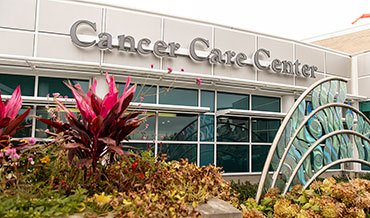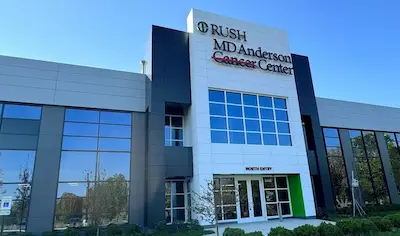The Rush Approach to Head and Neck Cancer
At Rush, we know that head and neck cancers can be frightening and that you have many questions. Our nationally recognized team of experts treat you as a whole person, not just your disease.
We offer the most advanced treatment options, including radiation therapy, immunotherapy for metastatic head and neck cancer and minimally invasive procedures to treat your tumor while preserving your appearance, and your ability to breathe, speak and swallow, as much as possible.
You'll have a team of experts dedicated to treating your cancer, while also focusing on your quality of life. Your team may include medical oncologists, radiation oncologists, head and neck surgeons, plastic surgeons, speech therapists, nutritionists and others. They'll all work together to develop a personalized treatment plan to help you recover faster and look and feel better.
Rush Excellence in Head and Neck Cancer Care
- A multidisciplinary team focused on you: We bring together a team of experts — head and neck surgeons, anesthesiologists, nurses, physical and occupational therapists and plastic surgeons — to review your case and discuss your treatment goals. Using their collective expertise, they will develop a personalized care plan that focuses on ensuring the best possible outcome for you and maintaining your quality of life.
- Innovative radiation therapy: Many head and neck cancers can be treated with innovative radiation therapy. This can be used alone or in combination with chemotherapy (known as chemoradiation) and/or surgery. Our experienced radiation oncology team offers the most advanced radiation treatments, including intensity modulated radiation therapy (IMRT) — which allows your team to target cancer cells while avoiding healthy cells and tissue. You may also receive radiation therapy to help ease side effects of head and neck cancers and cancer treatments like dry mouth, difficulty swallowing and inflammation.
- Advanced immunotherapies: Rush offers the most advanced immunotherapies for head and neck cancers, including recurrent and metastatic head and neck cancers.
- Pioneering research and innovative treatments: The Rush head and neck cancer specialists are national leaders in research and clinical trials aimed at improving treatment, including minimally invasive procedures — such as transoral robotic surgery (TORS) and photoimmunotherapy (PIT) — whenever possible to optimize outcomes and promote quicker recovery and reduced scarring. Head and neck cancer surgeons at Rush have specialized training and years of experience with TORS and Rush is one of the leading TORS centers in the Midwest.
- Comprehensive speech-language pathology services: Speech-language pathology services are an integral part of your head and neck cancer care plan. Our expert speech-language pathologists specialize in diagnosing, managing and treating difficulties related to speech, voice and swallowing. We work with you before you begin treatment to get a baseline assessment of your speech and swallowing function. During and after treatment, we provide comprehensive therapy and support to help you maintain and/or return to normal function. To personalize your care plan, we use the most advanced diagnostic tools, such as videofluoroscopy and fiberoptic endoscopic evaluation of swallowing. We also offer complete laryngectomy care services, including tracheoesophageal voice prosthesis training, care and management.
- Personalized medicine: Through our partnership with Tempus, a biotechnology company, we can use the data from your genetic makeup and how your tumor grows to create a targeted plan to prevent, screen and treat head and neck cancers.
- Enhanced recovery after surgery: Rush's enhanced recovery after surgery (ERAS) approach helps you prepare for and recover from head and neck cancer surgery. This approach allows you to recover faster, have a shorter hospital stay and avoid opioid medications for pain management. In fact, the use of opioids has decreased by 70% since we've instituted ERAS for our head and neck cancer patients. At the same time, our patients have reported experiencing less pain as well.










